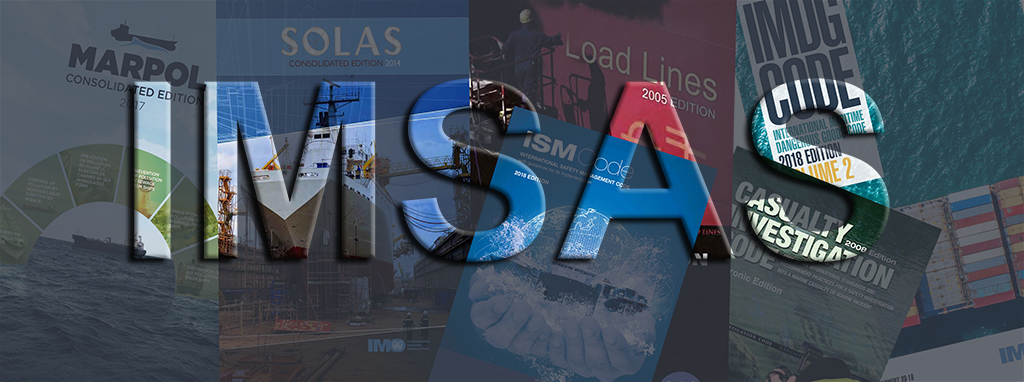Member State Audit Scheme

IMO’s main role is to create a regulatory framework for the shipping industry that is fair and effective, universally implemented, and that promotes safe, secure, environmentally sound, efficient and sustainable shipping. However, the benefits from such a regulatory framework can only be fully achieved when all Member States carry out their obligations as required by the instruments to which they are Parties.
Member States have the primary responsibility to establish and maintain an adequate and effective system to discharge their obligations as flag, port and/or coastal States emanating from applicable international law. IMO can assist Member States to improve their capabilities and overall performance in order for them to fully comply with the IMO instruments to which they are Parties.
The IMO Member State Audit Scheme (IMSAS) commenced as a voluntary Scheme in 2006 and became a treaty obligation in January 2016. It aims to promote the consistent and effective implementation of applicable IMO instruments and to assist Member States to improve their capabilities, whilst contributing to the enhancement of global and individual Member State's overall performance in compliance with the requirements of the instruments to which it is a Party.
The audit scheme, using the IMO Instruments Implementation Code (III Code) as the audit standard, aims to provide an audited Member State with a comprehensive and objective assessment of how effectively it administers and implements those mandatory IMO instruments which are covered by the Scheme.
Audits under the Scheme became mandatory on 1 January 2016, when the majority of amendments to IMO instruments, adopted for the institutionalization of the Scheme, entered into force. For the institutionalization of the Scheme the following IMO instruments were amended:
- the International Convention for the Safety of Life at Sea, 1974, as amended (SOLAS 1974) (resolution
MSC.366(93)).
- the International Convention on Standards of Training, Certification and Watchkeeping for Seafarers, 1978, as amended (STCW 1978) (resolution
MSC.373(93))
- the Seafarers' Training, Certification and Watchkeeping (STCW Code) (resolution
MSC.374(93)).
- the Protocol of 1988 relating to the International Convention on Load Lines, 1966 (1988 Load Lines Protocol), as amended (resolution
MSC.375(93))
- the Convention on the International Regulations for Preventing Collisions at Sea, 1972, as amended (COLREG 1972) (resolution
A.1085(28)).
- the International Convention on Load Lines, 1966 (LL 1966) (resolution
A.1083(28)).
- the International Convention on Tonnage Measurement of Ships, 1969 (TONNAGE 1969), (resolution
A.1084(28)).
- the Annex of the Protocol of 1978 Relating to the International Convention for the Prevention of Pollution from Ships, 1973 (resolution
MEPC.246(66)).
- Annex of the Protocol of 1997 to Amend the Convention for the Prevention of Pollution from Ships, as Modified by the Protocol of 1978 relating thereto (resolution MEPC.247(66)).
In accordance with the above amendments, each Member State, as a Contracting Government or Party, is responsible to facilitate the conduct of the audits and implement a programme of actions to address the findings, based on the guidelines adopted by the Organization (i.e. resolution A.1067(28) on the Framework and Procedures for the IMO Member State Audit Scheme (Framework and Procedures)). The Secretary-General of the Organization is vested with the responsibility for administering the audit scheme.
Audits of Member States are organized and implemented through a Quality Management System which complies with the requirements of ISO 9001:2015. The certified quality management system ensures that audits and all related activities are performed in accordance with the principles of sovereignty and universality; consistency, fairness, objectivity and timeliness; transparency and disclosure; cooperation and continual improvement; as stipulated in the Framework and Procedures for the IMO Member State Audit Scheme, established by Member States.
The audits are conducted in accordance with the overall audit schedule following the Procedures adopted by the Organization and are planned, conducted, and reported on, through the
MSA module in GISIS. The MSA module in GISIS provides a common platform for the implementation of audits and support to Member States, audit teams and the Secretariat in all major steps of the process, from planning through to the reporting phases of the audit.
Reporting from audits
Through the MSA module in GISIS, various audit reports are released to Member States and the public, in accordance with the authorization from the audited Member State. One authorized person from each Member State has full access to the audit reports from other Member States, including executive summary reports (ESR), corrective action plans (CAP) and each Member State's comments on the progress of the implementation of its corrective action plans (CPICAP). Member States can designate an authorized person following the procedure specified in Circular Letter No.3587, dated 15 September 2015.
Pursuant to paragraph 7.4.3 of the Procedures, the Secretariat prepares an anonymous consolidated audit summary report (CASR) on a periodic basis containing lessons learned from the audits. CASR, aims to facilitate the attainment of three of the objectives of the Scheme as contained in paragraphs 5.2.1, 5.2.3 and 5.2.4 of the audit scheme's Framework, and reflects the findings and observations issued during audits, as well as corresponding summaries of root causes identified by each audited State and summaries of corrective actions taken or proposed by each State, which provide valuable lessons for Member States. Furthermore, CASR contains best practices revealed in audits, in order to share them with Member States, with a view to assisting them to enhance further their implementation and enforcement of mandatory IMO instruments.
Since the commencement of mandatory audits of Member States, in 2016, the Secretariat has issued the following CASRs:
First CASR, issued on 4 September 2017, as Circular Letter No.3772 and contains the outcome from 18 mandatory audits that were completed in 2016.
Second CASR, issued on 10 October 2018, as Circular Letter No.3879 and contains the outcome from 15 audits (one audit carried out in 2016 and fourteen audits carried out in 2017)
Third CASR, issued on 13 September 2019, as Circular Letter No.4028 and contains the outcome from 17 audits (eight audits carried out in 2017 and nine audits carried out in 2018).
Fourth CASR, issued on 15 September 2020, as Circular Letter No.4317 and contains the outcome from 18 mandatory audits (11 audits carried out in 2018 and seven audits carried out in 2019).
- Fifth CASR, issued on 1 October 2021, as Circular Letter No.4442 and contains the outcome from seven mandatory audits (six audits carried out in 2019 and one audit carried out in 2020).
Lessons learned from audits, based on the analysis of CASRs, are reviewed by the III Sub-Committee and fed back into the regulatory process of IMO to help make measurable improvements in the effectiveness of the international regulatory framework for shipping.
MSC 101 and MEPC 75, endorsed a process proposed by III 5 for providing feedback from analysis of CASRs into the regulatory process of the Organization, as well as the methodology for analysing CASRs to assess the effectiveness and appropriateness of IMO legislation. Furthermore, MSC endorsed a process for providing feedback from audits for further development of technical assistance to Member States.
For more information on the analysis of CASRs please click
here